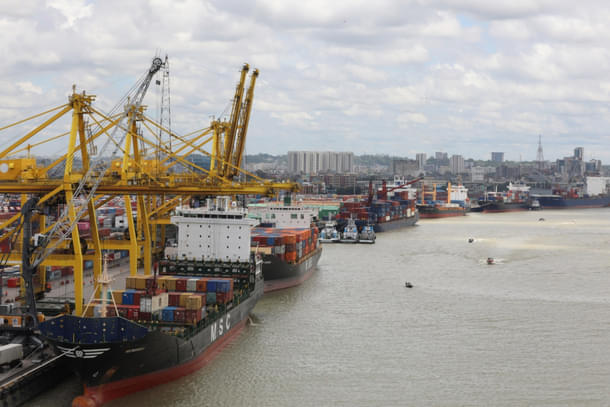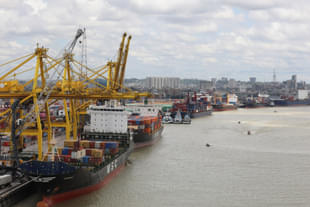World
Why A Pakistani Ship’s Arrival At Chittagong Sends Out An Ominous Signal To India
Jaideep Mazumdar
Nov 14, 2024, 08:39 PM | Updated 06:19 PM IST
Save & read from anywhere!
Bookmark stories for easy access on any device or the Swarajya app.


A Pakistani freight ship from Karachi docked at Bangladesh’s southeastern Chittagong port on Wednesday (13 November). It marked the re-establishment of direct maritime links between the two countries after 47 years.
The arrival of the Pakistani ship was hailed by Bangladesh’s Muhammad Yunus-led interim government, which has been trying hard to foster close ties with Pakistan.
This latest development is an ominous one for India. The Chittagong port is just about 75 kilometres (km) away as the crow flies from the Indo-Bangladesh border in Mizoram and about 225 km by road from Tripura’s capital, Agartala.
The port has, in the past, been used by militant groups of North East India, especially the United Liberation Front of Asom (ULFA) and the National Socialist Council of Nagaland (NSCN), to smuggle in truckloads of lethal weapons.
The opening up of the Chittagong port to Pakistani vessels is, thus, a dangerous development for India. Chittagong and its hinterland can easily be used by Pakistan as a beachhead to create trouble in North East India.
There have been no direct maritime links between Bangladesh and Pakistan since the formation of the former nation in 1971.
That’s because of the genocide of lakhs of Bengalis — both Hindus and Muslims — by the West Pakistani army and their Islamist collaborators — the ‘Razakars’ — from March 1971 till the abject surrender of the Pakistani forces to the Indian army on 16 December 1971.
The terrible crimes committed by the West Pakistani army on Bengalis remain etched in the collective memory of the masses in Bangladesh.
However, the country’s Islamists and sections of its armed forces and bureaucracy have always advocated for close ties with Pakistan.
Under military rulers, and also when the Bangladesh Nationalist Party (BNP) was in power, Pakistan managed to gain a lot of influence in Bangladesh and even offered training and weapons to insurgent groups in North East India.
But Sheikh Hasina firmly curbed Pakistan’s influence and protected India’s interests. She ordered a crackdown on the rebels from North East India who had been sheltered in her country and handed over a few to India.
However, the interim government that replaced Hasina, after she was overthrown from power on 5 August, has vowed to repair ties with Pakistan.
Yunus, the chief adviser of the interim government, has allowed pro-Pakistan Islamist radicals a free run in the country. Bangladesh’s Islamists are viscerally opposed to India.
Islamists and pro-Pakistani elements also occupy prominent positions in the interim government and have been advocating closer economic and military ties with Pakistan.
Yunus has also been making pro-Pakistan noises. For instance, he has lent his support to the Pakistan prime minister’s demand to revive the South Asian Association for Regional Cooperation (SAARC), which has been in a state of limbo because of India's refusal to engage with Pakistan within SAARC.
India has, over the past 10 years, followed a policy of zero engagement with Pakistan in any forum because of Pakistan’s policy of exporting terror to India.
Yunus’ advocacy for SAARC is viewed by New Delhi as a puerile attempt to needle India. But Yunus has not been content with asking for SAARC’s revival. He has also secretly been working towards closer military and strategic ties with Pakistan.
Powerful Islamist figures in Bangladesh, including some in the Yunus administration, have been openly advocating a formal alliance with Pakistan and China. A Beijing-Islamabad-Dhaka axis, these Islamists contend, will be an effective bulwark against India.
These Islamists and anti-India elements who have reared their heads and bared their fangs after the exit of Hasina from Bangladesh have also been talking of stirring up trouble in North East India.
Pakistan’s Inter Services Intelligence (ISI) and anti-India elements in Bangladesh’s military, diplomatic, bureaucratic, and political establishments have already started looking for opportunities to stir up trouble in the North East. They are reportedly behind the NSCN chief’s recent threat to resume insurgency (read this).
It is in this backdrop that the docking of a freight ship from Pakistan in the Chittagong port assumes disturbing significance.
Bangladesh-Pakistan Trade
The little trade that happens between Pakistan and Bangladesh does not warrant direct maritime trade between the two countries.
Bangladesh exports jute and other textile fibres, raw tobacco, and hydrogen peroxide worth about US $75 million to Pakistan and imports yarns, cement, copper, chemicals, and minor machinery worth about US $840 million from Pakistan.
Given this low volume of trade and the nature of imports and exports, it definitely does not make any economic sense to establish exclusive and direct shipping between the two countries.
According to shipping industry sources, both countries have been loading their exports to each other in containers belonging to other countries.
For instance, a container ship belonging to, say, Panama that stops at Karachi before an onward journey to a South East Asian country or even a port on the eastern Indian seaboard would be loaded with goods meant for Bangladesh. That ship docks at Chittagong, unloads the cargo from Pakistan, and then moves on to other ports. The same has been happening with Bangladesh’s exports to Pakistan.
Also, the distance between Chittagong and Karachi ports is 4,600 nautical miles (about 8,520 kilometres), which is nearly the same as the distance between Durban (South Africa) and Tuticorin (India) sea ports.
To have exclusive maritime links over such a long distance for such a low volume of trade makes no economic sense at all.
That is why concerns have been raised in India over the establishment of a direct maritime link between Pakistan and Bangladesh now.
But India should not take this lying down. New Delhi has to make it abundantly clear to Yunus that he will be held responsible for any trouble created by Pakistan or the Islamists in his country in North East India.
Yunus also has to be told that India has the capability of imposing punitive costs on Bangladesh for any misadventure.
Yunus, and Bangladesh’s pro-Pakistani and anti-India Islamists, have to realise that the cost of trying to needle India will be very high.
Also Read: India Must Draw Clear Red Lines For The New Regime In Bangladesh




